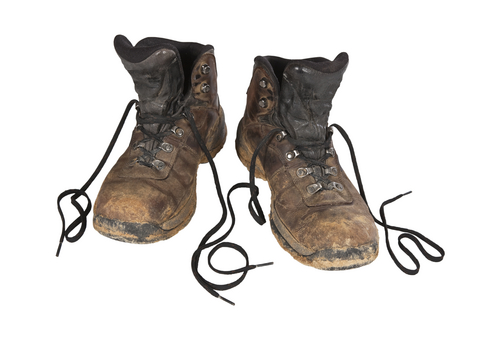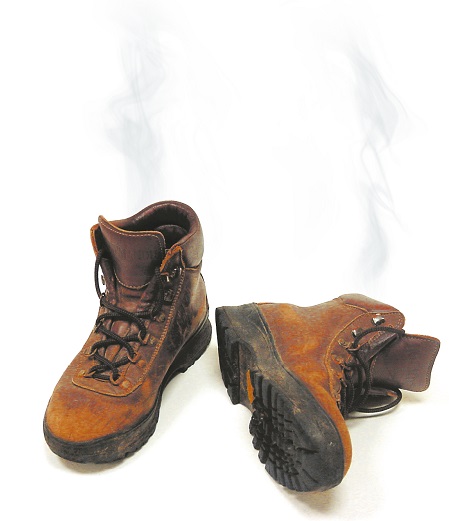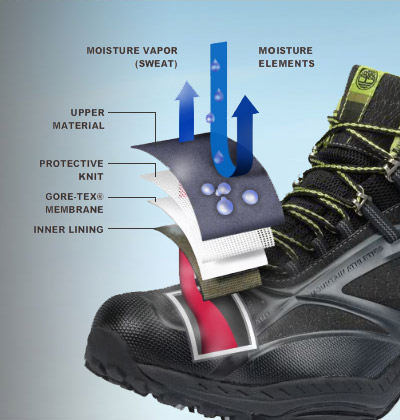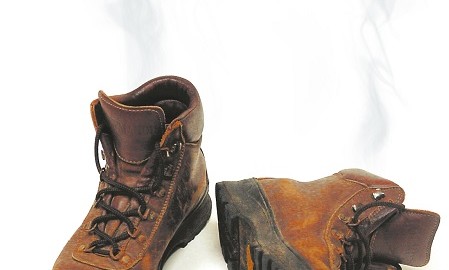Construction workers, welders, oil rig workers, and their wives (or husbands) all know this.
Any job that involves wearing work boots comes with one very distinct, and often frustrating, problem: the terrible smell.
There is absolutely no faster way to clear a room than a hard-working man or woman coming home after a long day and removing their work boots.
The problem with work boots
Many modern, insulated work boots have fancy linings such as Thinsulate that are sealed very tightly and won’t allow your feet to breathe.
“In my work boots my feet sweat so bad that they’re soaked after an hour or two”
Boot insulation is comfortable in winter but can get hot during summer. This does not only cause excessive sweating but may also cause athletes foot as hot and damp boots are the perfect breeding ground for fungus and mold.
What about normal boots?
Wearing a pair of just normal, old-style leather boots will make your feet sweat less but most of the time, these are just not durable enough.
Many professionals such as masons, blacksmiths, carpenters, and welders will expose their boots to a fair amount of abuse. Because of this, and from a safety aspect, special works boots are a necessity.
Keeping your work boots fresh, why you are doing it all wrong
Here’s the thing, you can treat your feet with essential oils or creams and sprinkle the steel-toed boots with baking soda, Alum powder or other substances to de-stink them but that doesn’t work for long, now does it?
If at all.
Let me guess..
Inserting odor-fighting insoles, airing those musty boots on the porch and even rotating your footwear doesn’t help much either.
“Odor-eating insoles work for a week and then my work boots smell again”
Why is that?
You’re not attacking the problem at its core.
What causes work boots to smell?

The simple answer is ‘sweat’. The more nuanced answer, bacteria (and possibly fungi) thriving because of the sweat.
Each one of your feet contains a remarkable 250,000 sweat glands. Each and every one of those glands releases sweat in order to help cool your body.
When you work, you sweat (if you’re not sweating, you’re doing it wrong) and thanks to the cozy warmth of your protective footwear it ends up causing bacteria growth, which results in the funky scent.
4 reasons your work boots smell so bad
1. Most boots are designed to protect your feet from job-related injuries (mostly things falling on them on indoor or outdoor job sites). Their design creates a lack of ventilation and airflow in your footwear.
“My work boots don’t breathe, I have to change socks twice each shift”
2. Steel-toed boots come with a problem all of their own. Steel isn’t very well known for it’s ability to ventilate so steel toe boots often cause more foot odor than any other type of boot.
- What’s more is that the steel inserts in steel-toed boots can conduct cold, heat (even current), adding to ideal conditions for foot odor.
3. Especially in factory and oil rig settings, the outside of boots get covered with grease and oil so the insides get sweaty and really funky.
4. And of course you’re working, your body heats up, you walk a lot in your heavy boots, so you sweat more than normal.
Workboots increase workplace safety but can reduce foot hygiene
How to treat your work boots and keep them from stinking

Do you wear boots during hiking or hunting? Or boots with membranes such as Gore-tex?
Better not use sprays, creams, powders in your boots because these can clog the pores of the membranes and foreign scents may cause the wildlife to be alarmed.
On the other hand, it’s often recommended to keep your boots treated with the right type of boot grease or other leather preservatives. Slathering bee’s wax the seams also helps your boots last longer.
How to keep dry and fresh feet in work boots
Here are some ways you can control that deadly odor and rejoin the human race:
Keep your feet clean – Washing daily with a good antibacterial soap will get rid of all the pesky bacteria and the smell that comes with it. Soaking your feet in a bath of Epsom salts will also kill the bacteria while also relaxing your muscles.
Alternate boots – If your budget allows it, invest in a second pair of work boots and wear them each other day. While this isn’t the most cost-effective method, alternating the boots you wear will allow them to fully dry out over a 24 hour period, reducing the chance of continual smell.
Change socks often – If necessary a few times a day. This will prevent foot odor and your boots will last longer.
Store boots properly – After wearing your boots, store them in light, ventilated spaces as bacteria thrive in dark, damp areas.
Dry your (membrane) work boots – Stuff them with newspapers which will draw out the moisture. Use a hair dryer if you’re in a hurry. Here some more tips on how to dry boots.
- Or get a boot dryer. After work, plug it in, stick the boots on and they are completely dry the next work day. This is essential to clear out the bacteria.
Avoid foot powders – Most brands contain cornstarch. When it gets moist it makes an ideal growing bed for fungus. Insert a sock filled with kitty litter or some activated charcoal overnight to reduce foul scents.
Have you considered this?
It’s not your boots, it’s your socks
Wearing cotton socks in boots is a surefire way to stink up the place. Cotton socks absorb sweat and keep it in touch with your feet. When it’s cold your feet cool off, and when it’s warm your feet will feel soggy and blisters form more quickly.
Not wearing appropriate socks in your work boots is asking for trouble
Wear thick, soft performance socks made from natural fibers. Get heavier socks, specially made to wick the moisture away from your feet for the best results. Get moisture wicking socks.
In the military and the medical field they know to wear wool socks. Just as hikers do. Wool socks are a must if you have sweaty feet in work boots.
“Wear socks in your work boots made with the highest percentage of merino wool you can get, comfortable, soft and dry on the feet”
High quality work boot socks such as Wigwams Men At Work, Drymax Workboot, and Carhartt Crew socks will keep your feet dryer.
These dual-layered socks offer extra comfort and protection because of padded toes and heels.
For the most popular brands see these top rated work boot socks.
Sprinkle a bit of Zeasorb-AF (from Amazon or Walmart) in the socks to control foot odor.
Wearing the right socks and still sweat? Get better boots.
Consider this when getting new boots
Insulated vs non-insulated boots
It really depends on your line of work. For rough terrain work, on factory floors or working on concrete surfaces you may not need insulated boots.
Consider getting insulated boots only when you really need them. For instance when working in the mud, wet snow or under other types of wet circumstances. Many owners can attest that insulated work boots make their feet sweat like crazy.
Natural materials
Purchase boots made from natural materials that let air flow such as leather. Synthetic, artificial fabrics trap the sweat and germs that cause odor.
Here are some things to consider when buying your next pair of work boots.
Breathable lining

Breathable, moisture-channeling membranes allow footwear to breathe so sweat and moisture can get out.
Gore-tex lining, Dry-lex footwear lining and Keen Dry waterproof breathable membrane are a few of the most popular choices.
Make sure not to grease up the leather of your lined boots as this seals them up rendering the whole breathable lining useless.
Antimicrobial linings
Some work boots offer additional odor control by antimicrobial linings that kill the odor-causing bacteria.
- Timberland’s Pro Titan 6″ Alloy Toe Work Boots for instance, come with antimicrobial Cambrelle lining.
Non-metal safety toes
Next generation work boots feature safety toe clads made from non-metallic composite substitutes. Non-metal alternatives to steel toed shoes provide the same safety.
A great option for when you don’t want to wear soft toe or metal toe boots but need protection against workplace hazards.
More recommended work boots
Red Wing boots
Red Wing, the mother company of Carhartt, is one of the last great work apparel companies in the US. Visit your local Red Wing store to see if they have a clearance.
They will often knock off up to 70% of the original price so you will be able to pick up some $200 USA made boots for 60 bucks.
Danner boots
Danner Elk Hunter boots with Gore-tex are a popular choice.
Bates Durashock boots
Bates DuraShocks Made in the USA from real leather and Vibram soles.
Wrapping it up
Quality, heavy work boots can be expensive but give good support, last long and offer optimal protection.
Good boots will keep your feet dry, provided that you wear the right socks and take good care of your boots by treating them with grease, air them out, use antibacterial substances, and let them dry out completely if necessary.
Featured image: Anna’s Hope. steaming boots, wheatfields.

Hello.
I’ve been wearing my Wolverine steel toed work boots for about 6 months, and boy do they stink. I’ve read all the tips to prevent, but how to I de-stink the ones that I have?
Try a really heavy dusting of the inside lining with Gold Bond Brand Medicated body powder or dollar store body powder (menthol or peppermint or lavender scents seem to work the best to kill the funk).
In my experience steel/aluminium/composite work boots condense inside due to lack of breathability, apart from using anti perspirant on feet which will stop sweat building up, dusting the inside of the boots with boric acid powder and using a homemade mix of diatomaceous earth and boric acid powder about 4/1 ratio on skin as a foot powder will kill any smells and stop trench foot. Change the ratio if needed, hope this helps.
Put one plain charcoal briquette ( no chemical added ones) to each boot after wearing, cover them with a towel. Leave in till you need to wear them again. I do this to my husbands boots every weekend. And he had really stinky boots. Stink up the bedroom. Not any more. Just try it.
How can I fix door in old boots
You have to remove the old door with a special tool first; a boot de-doorcombobulator. Then you should get new hinges made for the type of boot that also match the new door you want to install. It’s not too hard really. I’d look into boots that have a modula door though, they just pop on and off pretty easy. Now windows…man… fixing windows in a boot is a whole other mess.
It depends on how the door entered the boots. If it entered the normal foot hole, removal should be simple enough, but your boot will likely be too stretched to wear. If the door was wooden, be careful to remove any splinters before inserting your foot. If the door entered otherwise, I would consult a cobbler/carpenter.
When NY husband comes home from being in the field the boots come back so bad it can make the whole half of the house leaving you heaving. In all the things I’ve tried that worked best is odoban. It’s a liquid sold at hardware stores or Amazon. It works miricles. You spray till its soaking wet in the inside and point a fan inside over night. Last time I did it three times and by the end you couldn’t smell anything anymore. Also taking out inserts and throwing them in the washer.
Can your products work for rubber steal toes?